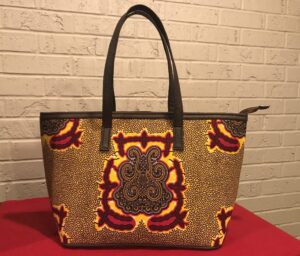By Mabel Delassie AWUKU
Bella, a young entrepreneur in Accra, once dismissed the idea of wearing Ghanaian prints daily. To her, traditional wear was reserved for special occasions, Fridays at best. Her wardrobe was filled with imported fabrics, believing they were more “modern” and professional.
But one day, she found herself in a bustling fabric market, watching a skilled woman meticulously weave Kente patterns with a technique passed down through generations.
Curious, she struck up a conversation. She explained how each thread represented a story, how every pattern carried meaning, a legacy of the past woven into the future. More than that, the sale of just one piece of fabric fed families, sustained communities, and kept centuries-old craftsmanship alive.
That moment changed Bella’s perspective. She realized that every time she chose foreign prints over her heritage, she was not only neglecting Ghanaian artisans but also the economy that thrived when people embraced their own.
Since then, she’s made it a mission to proudly wear Ghanaian fabrics daily, not out of obligation, but because it reflects who she is, a proud Ghanaian investing in her people’s craft and future.
Why must anyone convince you to wear Ghanaian-made fabrics? Why should African prints be reserved only for Fridays while other prints dominate our wardrobes throughout the week? This mindset does more than just dictate fashion choices; it speaks volumes about how we value our heritage and economy.
Every stitch of Ghanaian fabric carries history, craftsmanship, and an economy that thrives when we choose to wear what is ours.
Each piece purchased fuels employment, putting money directly into the pockets of tailors, textile workers, and designers who, in turn, contribute to the local market, sustaining a cycle of economic growth. It’s more than fashion, it’s empowerment.

The reality is simple: supporting Ghanaian-made products, whether fabrics, food, or crafts, isn’t just an act of patriotism but an investment in our identity and prosperity. The push to embrace our culture should not rely on persuasion.
It should be an innate understanding that preserving and promoting Ghanaian creativity is everyone’s responsibility.
The Black Star Experience, envisioned as a program, is not merely an initiative; it is a lifestyle. It is a call to immerse ourselves in the richness of Ghanaian hospitality, cuisine, and traditions that make us distinct.
Our daily choices should reflect our pride; from the foods we eat to the garments we wear, and the stories we tell the world.
Let us move beyond scheduled cultural appreciation and make Ghanaians wear a daily declaration of who we are. Let our support for local industries be an ongoing commitment, not just an occasional token. This is our identity; this is our economy. Let’s own it—every day of the week.
The author is the Public Relations Officer, Ministry of Tourism, Culture and Creative Arts










